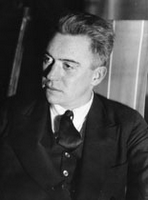 Hart Crane born 21 July 1899 (d. 1932)
Hart Crane born 21 July 1899 (d. 1932)Ohio-born Harold Hart Crane had a difficult childhood due to his parents' constant fighting and when they divorced in 1916, Crane soon dropped out of high school and fled to New York, where he found a place he felt he belonged.
Much of his poetry is set in New York and heavily influenced by his homosexuality. His mother's Christian Science upbringing made him feel like a social pariah and he found the alienation that came from his homosexuality essential to his poetic vision. This however did not make for a happy life.
 He was published in well-respected publications throughout the 1920s and his first collection of verse White Buildings (1926) was well-received. He set about writing an epic poem called The Bridge which sought to surpass T S Eliot's The Wasteland, which he admired, but to which he thought he could bring a more spiritual element, to create an American masterpiece. The bridge in question was the Brooklyn Bridge, which he saw as symbolic and could see from his apartment - he also frequented the docks around it, looking for amenable sailors. On publication in 1930, his masterpiece received generally poor reviews, which the heavily drinking, alienated Crane took badly.
He was published in well-respected publications throughout the 1920s and his first collection of verse White Buildings (1926) was well-received. He set about writing an epic poem called The Bridge which sought to surpass T S Eliot's The Wasteland, which he admired, but to which he thought he could bring a more spiritual element, to create an American masterpiece. The bridge in question was the Brooklyn Bridge, which he saw as symbolic and could see from his apartment - he also frequented the docks around it, looking for amenable sailors. On publication in 1930, his masterpiece received generally poor reviews, which the heavily drinking, alienated Crane took badly.His one heterosexual affair ended in marriage to Peggy Cowley, the former wife of a friend, and one of his best works The Broken Tower was the result. However, tormented by feelings of failure and depression and drinking ever more heavily, he soon resumed his homosexual activity. He appears never to have sought a sexual relationship with any of New York's artistic community, preferring anonymous rough pick ups in bars and speakeasys or at the docks.
Just before noon on April 27, 1932, on a steamship passage back to New York from Mexico where he had been on a Guggenheim fellowship — right after he was beaten up for making sexual advances to a male crew member, which may have appeared to confirm his idea that one could not be happy as a homosexual — he committed suicide by jumping into the Gulf of Mexico. Although he had been drinking heavily and left no suicide note, witnesses believed Crane's intentions to be suicidal, as several reported that he exclaimed 'Goodbye, everybody!' before throwing himself overboard. His body was never recovered.
Although difficult to read and linguistically challenging, Crane has proved to be one of the most influential poets of his generation.